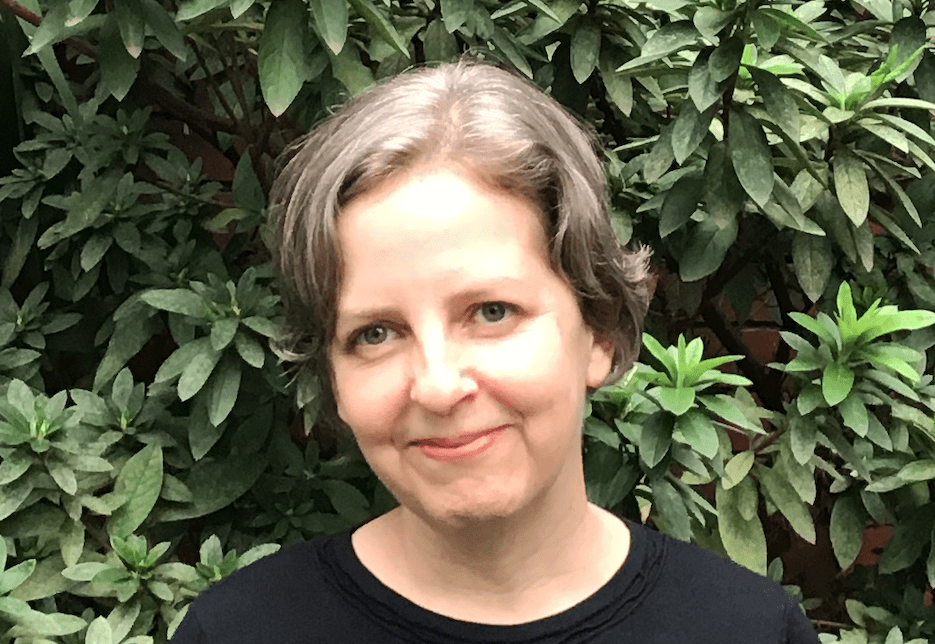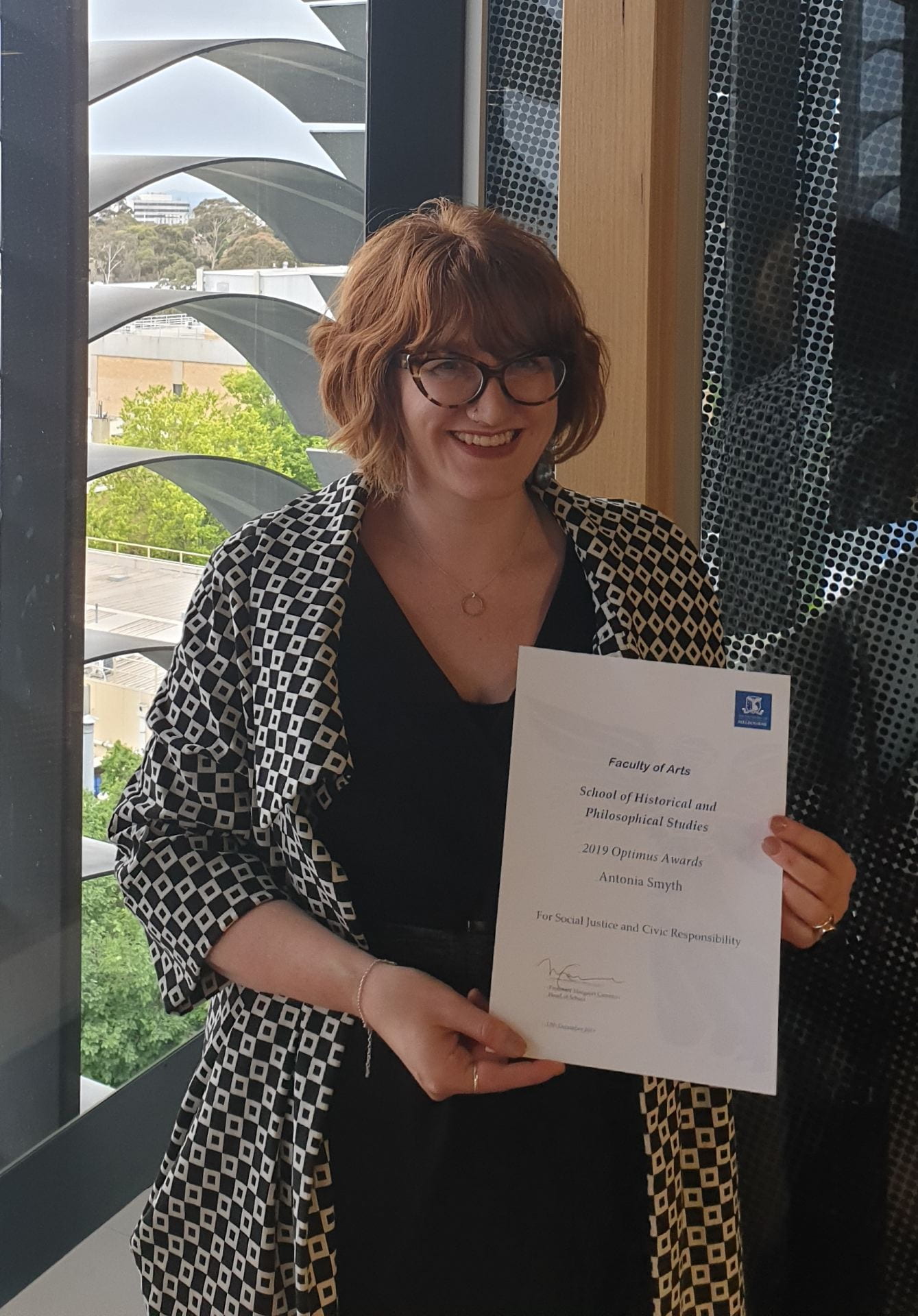
The Inaugural SHAPS Optimus Awards
In 2019 SHAPS Head of School Professor Margaret Cameron launched a new set of annual awards. Through the Optimus Awards, SHAPS will recognise and celebrate members of our community who exemplify one or more of the values articulated in the Faculty of Arts Strategy Map 2019–2025. All members of the School community, including undergraduate and postgraduate students, academic staff, honorary fellows and associates, and professional staff, are eligible for the awards.
In 2019 nominations were invited in the following categories:
- Courage and Creativity – those whose actions and words demonstrate courage and creativity through problem-solving, taking initiative, or in other ways.
- Social Justice and Civic Responsibility – those whose actions and words promote social justice and civic responsibility through supporting people, stabilizing systems, or in other ways.
- Trust and Mutual Respect – those whose actions and words convey trust and mutual respect through leading people, mentoring colleagues and/or students, or in other ways.
- Intellectual Freedom and Civic Responsibility – those whose actions and words champion intellectual freedom and critical independence through writing, publishing, public speaking, teaching, or in other ways
The 2019 award winners were:
Courage and Creativity: Dr Julie Fedor
Social Justice and Civic Responsibility: Antonia Smyth
Trust and Mutual Respect: Dr Dan Halliday
Intellectual Freedom and Critical Independence: Associate Professor Frederik Vervaet
Below we present anonymised excerpts from the nominations that were received for these awards.
Courage and Creativity: Dr Julie Fedor
In her role as School Engagement Chair, Julie Fedor has gone far beyond the call of duty. Her creative ideas about how to publicise SHAPS activities and achievements, along with her immense hard work, have succeeded in making SHAPS members, from undergraduates to senior staff, feel that their work is more recognised and more valued, and that we are all part of a vibrant team.
Her innovations include conceiving and developing the SHAPS Forum research blog, which she produces together with a team of post-graduate research students (headed by Nicole Davis) and in consultation with the SHAPS Engagement Committee. This is a project that has required creativity, tenacity, and problem-solving; it has been a labour of love.
 Julie has worked to mentor and to raise the visibility of postgraduate researchers in the School and has shown generosity, responsibility and creativity in her commitment to supporting the postgraduate community. Julie really gets to know and understand the research interests of the students she works with. She is careful to offer students leads and suggestions and to provide opportunities for them to shine, but she also lets them take an idea or an opportunity and run with it. She edits SHAPS Forum with great care and respect, showing good will in mentoring up-and-coming scholars and presenting the continuation stories of our alumni and fellows through the Forum. Her efforts have brought SHAPS closer together as a community.
Julie has worked to mentor and to raise the visibility of postgraduate researchers in the School and has shown generosity, responsibility and creativity in her commitment to supporting the postgraduate community. Julie really gets to know and understand the research interests of the students she works with. She is careful to offer students leads and suggestions and to provide opportunities for them to shine, but she also lets them take an idea or an opportunity and run with it. She edits SHAPS Forum with great care and respect, showing good will in mentoring up-and-coming scholars and presenting the continuation stories of our alumni and fellows through the Forum. Her efforts have brought SHAPS closer together as a community.
Social Justice and Civic Responsibility: Antonia Smyth
 In 2018, Antonia Smyth, who is currently studying for a Masters in Philosophy, initiated and co-founded the University of Melbourne Minorities and Philosophy (MAP) chapter. Previously, as an Honours student, in 2013, Antonia co-founded the Women in Philosophy at the University of Melbourne (WIPUM) group. Aimed at addressing the male-dominated state of Philosophy, this group was integral to supporting a number of women philosophy students and also played an important role in consciousness raising within the wider philosophy student community.
In 2018, Antonia Smyth, who is currently studying for a Masters in Philosophy, initiated and co-founded the University of Melbourne Minorities and Philosophy (MAP) chapter. Previously, as an Honours student, in 2013, Antonia co-founded the Women in Philosophy at the University of Melbourne (WIPUM) group. Aimed at addressing the male-dominated state of Philosophy, this group was integral to supporting a number of women philosophy students and also played an important role in consciousness raising within the wider philosophy student community.
The MAP initiative was motivated in part by a growing recognition that the project of diversifying philosophy required supporting not only women, but all people from marginalised minorities more generally, including racialized, working-class, disabled, neurodiverse, and trans and gender diverse students. In her work for MAP, Antonia successfully organised weekly seminars showcasing the work of minority students, as well as visiting speakers.
Antonia’s commitment to social justice is present in both her philosophical and non-philosophical work. Her current research examines the epistemic injustice in psychiatry, with a focus on compulsory psychiatric treatment. Her interdisciplinary research draws on Mad Studies and consumer/survivor literature to centre those with lived experience. This work prompted productive discussions at the 2018 and 2019 Australasian Association of Philosophy conferences and the 2019 International Spring School on Human Rights and Mental Health at Ruhr University, Germany.

Antonia has also worked within the mental health sector for a number of years, previously at the Second Opinion Psychiatric Service, and currently at Independent Mental Health Advocacy (Victoria Legal Aid). Prior to her current work on conceptions of mental health and illness, Antonia worked in the Alcohol and Drug sector and researched the impact of stigmatisation of people who inject drugs.
During her time at SHAPS, Antonia has mentored and supported a number of her peers, particularly through her work in WIPUM and MAP. Her ongoing guidance and support have been integral to fostering marginalised students’ sense of belonging and comfort in what would otherwise be daunting situations. As someone who centres people’s wellbeing above all else, Antonia has always shared her knowledge, support and time with those who might need it.
Trust and Mutual Respect: Dr Dan Halliday
 Dan’s professional life and contribution to our academic community demonstrates each of the core values of the Arts Faculty, especially the value of trust and mutual respect.
Dan’s professional life and contribution to our academic community demonstrates each of the core values of the Arts Faculty, especially the value of trust and mutual respect.
Dan’s mentoring and support of students is exemplary. Whether it is in a teaching, supervisory, or collegial capacity, Dan serves as a trustworthy and supportive source of counsel. Dan’s door is always open for his students and supervisees, and indeed for all postgraduate students in the program. There are numerous instances of Dan supporting the development of students’ academic work, dedicating liberal amounts of time to reading their pieces and talking through their ideas. Furthermore, he shows genuine concern for the wellbeing of his students and for the student cohort as a whole and always provides any assistance he can to improve relations and experiences in the department. He demonstrates a willingness and ability to lead and mentor students in a respectful manner that helps further their academic prospects.
Dan has often provided support and inspiration to prospective students. Many students remember him as the person who reached out and encouraged them to pursue philosophy. He is equally generous in his support for former students, giving ongoing advice on their work and careers, going well beyond what is expected of a supervisor. Dan does all these things with the utmost professionalism. For these reasons, we see Dan as demonstrating the value of trust and mutual respect.
Intellectual Freedom and Critical Independence: Associate Professor Frederik Vervaet
This award is for “those whose actions and words champion intellectual freedom and critical independence through writing, publishing, public speaking, teaching, or in other ways.” It is difficult to think of anyone who fits this description better than Frederik Vervaet.
Frederik is a determined champion for the autonomy of academics to decide how best to pursue their own research, regardless of metrics, points, rewards, or penalties. He does not hesitate to speak up when policies adversely affect the freedom of academics to pursue their own work as they see fit.
 If there is a consistent thread in Frederik’s views, it is that academics are at their creative best when they are allowed to make their own choices about how to pursue their research and teaching. He believes that academics must have space to choose their own paths, which will be shaped by their own creative interests, the specific contours of their fields, and their life circumstances. Frederik consistently reminds us that there are other ways to do things and that micro-managerialism is not the best answer to many problems. Frederik’s role is essential: he reminds us of what we lose when we submit to pragmatic shortcuts, and he calls us to do better.
If there is a consistent thread in Frederik’s views, it is that academics are at their creative best when they are allowed to make their own choices about how to pursue their research and teaching. He believes that academics must have space to choose their own paths, which will be shaped by their own creative interests, the specific contours of their fields, and their life circumstances. Frederik consistently reminds us that there are other ways to do things and that micro-managerialism is not the best answer to many problems. Frederik’s role is essential: he reminds us of what we lose when we submit to pragmatic shortcuts, and he calls us to do better.
It should also be noted that Frederik expresses his views without personal rancour and while managing to be personable and collegial at all times. He is somehow cheerful in his opposition! He thus contributes to a climate of respect and tolerance that we all value and appreciate.
We are looking forward to launching the Optimus Awards for 2020 very soon. Given that this has been the most unusual year, it will be important for all of us to reflect on the Faculty’s values and consider nominating a member of the SHAPS community in light of them. We will focus on four new values for the award categories. Keep your eyes open for the announcement.